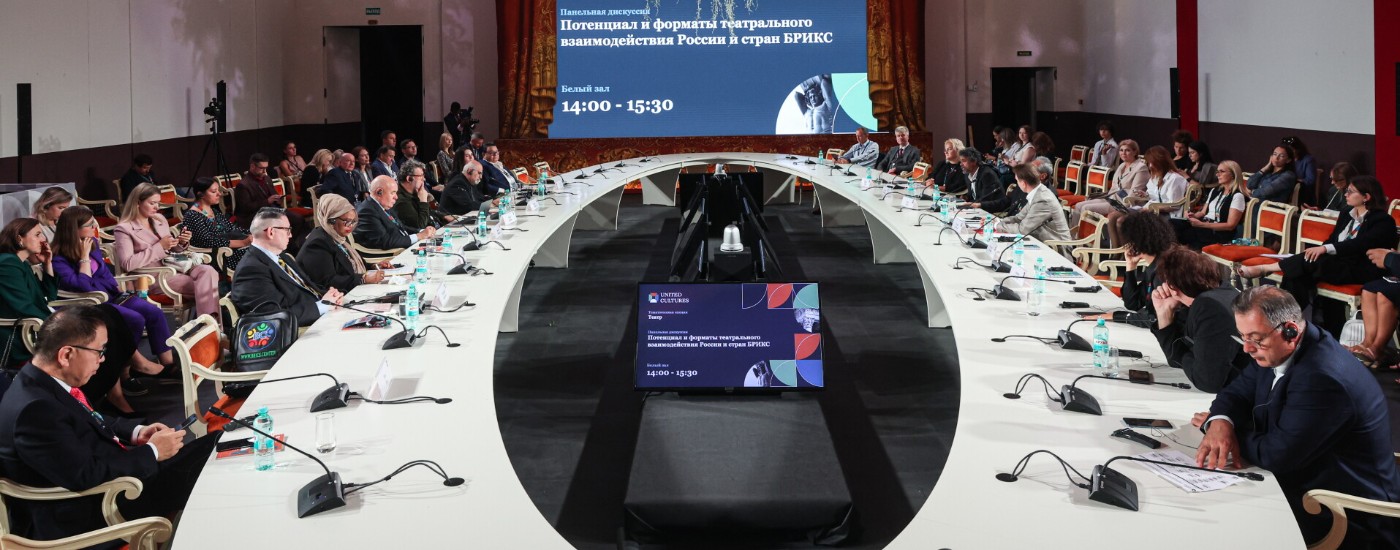As part of the "Theater" thematic section of the X St. Petersburg International United Cultures Forum, a panel discussion on "The Potential and Formats of Theatrical Interaction between Russia and BRICS Countries" was held. Representatives from Russia, Brazil, India, China, South Africa, the UAE, Iran, Egypt, and other countries discussed ways to collaborate among theaters, educational institutions, and production centers from BRICS nations.
On the key platform of the business program of the X St. Petersburg United Cultures Forum, the panel discussion "The Potential and Formats of Theatrical Interaction between Russia and BRICS Countries" took place. Speakers from Russia, Brazil, India, China, South Africa, the UAE, Iran, Egypt, and other countries discussed cooperation methods between theaters, educational institutions, and production centers of BRICS countries. In the context of the discussion, co-productions, festivals, exchanges of educational methods, and information and educational activities were considered cooperation instruments. The possibility of using an economic approach to create more effective interaction was also discussed.
The panel discussion moderator was the curator of the "Theater" section and the artistic director of the State Theater of Nations, Evgeny Mironov. Participating in the discussion were the Special Representative of the President of the Russian Federation for International Cultural Cooperation Mikhail Shvydkoy, professor at Ahmedabad University (India) Dipan Sivaraman, president of the National Drama Theater of Russia (Alexandrinsky Theater) Valery Fokin, rector of the Russian Institute of Theatre Arts — GITIS Grigory Zaslavsky, Iranian director and theater figure Behrouz Gharibpour, head of the graphic design department of the State Theater in Johannesburg (South Africa) Katleho Mofolo, artistic director of Armazém Theatre Company (Brazil) Paulo Moraes, Egyptian theater figure Khaled Galal, general director of the International Chekhov Theater Festival Karina Tsaturova, artistic director of the State Russian Drama Theater named after Stanislavsky (Armenia) Karen Nersisyan, artistic director of the Bishkek Theater named after Chingiz Aitmatov (Kyrgyzstan) Vyacheslav Wittich, director of the Minsk Regional Drama Theater (Belarus) Elena Sokolovskaya, head of the Kazakh State Academic Theater for Children and Youth named after G. Musrepov (Kazakhstan) Farhad Moldagali, artistic director of the theater in Ferrara (Italy) Moni Ovadia, general director of the Bolshoi Theater of Belarus (Belarus) Ekaterina Dulova, Minister of Culture of Djibouti Hibo Moumin Assoweh, and deputy director of the Astana Ballet theater (Kazakhstan) Valery Kuzembaev.
Mikhail Shvydkoy opened the discussion by emphasizing that Russia is ready to cooperate in the cultural sphere with all BRICS participants. Still, finding a new approach to collaborating with artists from different countries is important: "It is important to understand who we are ready to cooperate with. To work, we need to create a special program. If we focus on cultural programs, there will be one pianist from China, one artist from India, and one painter from Brazil. In countries with no large market, other things need to be developed. Unifying here won’t be possible, so I must adopt an economic approach. Without it, we won’t be able to do anything. Where there is a market, certain mechanisms work. For example, the Arab Emirates are ready to embrace new dramatic art, and in Brazil, theaters are still ready to cooperate."
Karina Tsaturyan recalled Russia's theatrical experience at the international level: "In 2006, we had a Russian theater season in Brazil, simultaneously in five cities. In 2001, the Chekhov Festival held a remarkable Brazilian season. Let’s note that during the Chekhov Festival, there were seminars and master classes for young participants. In the future, we are expecting a festival in Vladivostok with Chinese colleagues. Almost every day, we receive offers of cooperation from different parts of the world."
Vladimir Fokin advocated for cooperation between domestic and foreign theaters through a non-traditional plan: "On behalf of the Alexandrinsky Theater, I am ready to offer all BRICS participants collaboration through co-productions. This way, we will be able to achieve new heights."
Behrouz Gharibpour, the Iranian director, decided to share his opinion on the distinctive features of building relationships between Russia and Iran. In his view, when developing cultural relations, it is essential to strive for reciprocity and consider the cultural heritage of both nations: "Iran and Russia are very close countries. But we know little about each other. An image came to my mind: Russia and Iran are like two houses with a small partition between them, but just look over the top, and everything becomes clear. A hundred years ago, women in Iran could not write, perform in theaters, or dance. I sincerely wish for fruitful cooperation between Iran and Russia."
It was also noted that Russia plans to strengthen cooperation with South Africa. Katlego Mofolo highlighted theater as the most productive form of such cooperation: "Economic activity remains active regardless of your mental or emotional state. Human activities occur within time and space, enabling the appreciation of sovereignty and fostering global thinking. Theater is an advantage because it is a living art form that can be enjoyed. Theater captures emotions in a very unusual manner because it is immediate and can address exceptional issues, contributing to emotional well-being and health."
Summarizing the panel discussion, Evgeny Mironov emphasized that more is needed for cultural cooperation among BRICS countries to merely discuss pressing issues; timely solutions must also be found. The "Theater" section curator suggested striving for a shared professional language so that theater groups worldwide can understand each other. According to Mironov, efforts should first be directed toward creating joint educational and awareness-raising events and organizing exchanges of academic methods.






